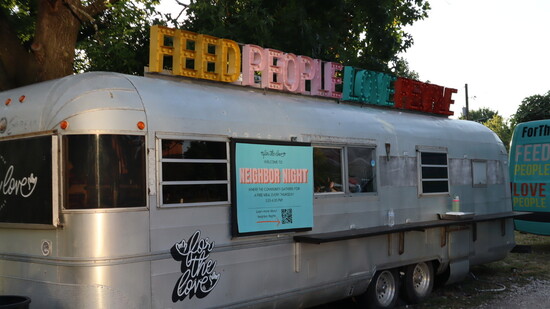Some things are simply part of being human. Hunger is one of them. And while eating alone isn’t unusual, there’s something deeply familiar about sharing a meal with others.
From the beginning of time, people have gathered around food—cooking together, passing plates, telling stories. Sharing a meal is more than just filling our stomachs. It’s about filling a need for connection. Around a table, or even a campfire, we find safety, belonging, and a sense that we are part of something bigger than ourselves.
When we gather with others—whether it be around a table, a campfire, or even just in conversation—we are reminded of the bonds that hold us together. Community secures us to our past through tradition, our present through connection, and our future through trust.
There are, however, people who find themselves on the outskirts of our campfires, without easy access to food or a community to share it with. Hunger may touch us all, but its impact is not the same for everyone. And being left out of the circle can leave us starved for more than just food—it can leave us longing for the nourishment of connection.
In 2020, at the height of Covid, three women recognized this reality, as well as the need for more support, community, and love for the hungry and displaced here in Northwest Arkansas. Their names are Meredith Chapuis, Jennifer Cristofaro, and Melinda Williams.
Meredith, Jennifer, and Melinda quickly got to work, and with the help of friends, family, and volunteers—not to mention a hot off the lot food truck—For the Love began.
For the Love is a non-profit organization that serves our community every Monday, Tuesday, and Thursday night in Springdale, Rogers, and Bentonville.
A location is coming soon to Fayetteville.
It is their mission, “ … to not only feed the hungry, but feed the soul,” and by inviting everyone into their campfire, hungry people are fed and a unique community is cultivated. Their intention of addressing poverty in this way shows that, at the end of the day, we are all just neighbors who need food and need each other.
“We believe that food is more than sustenance. It’s a bridge to connection, community, and resources,” said Jennifer Cristofaro, one of For the Love’s founding members.
Jennifer also pointed out the vitality of sharing in the lives of people with different socioeconomic backgrounds, political beliefs, and religious views. Thinking with others challenges our perspectives and teaches us not just what, but how to think. “Getting to know these people over the years has really changed my perspective, especially about the people being affected by certain policies.”
One of the things realized in spaces like For the Love is the development of friendships that might otherwise seem unlikely. Something about sitting down with people and hearing their life stories bridges the gaps between different modes of thinking. It takes down our walls and allows us to be as we are, seeing others as they are too.
To attend one of For the Love’s neighbor nights is to hear countless stories of the ways in which people’s lives have been changed through the friendships they have built over the years. Through yoga classes, birthday celebrations, and people going out of their way for one other, those who once felt alone now feel at home with a community of friends and family to share life with.
Iris Murdoch defines love as the “extremely difficult realization that something other than oneself is real.” This requires looking at someone else and seeing them not only as a person, but someone deserving of love and sacrifice as much as any other.
For the Love doesn’t just believe this—they live it. As they’ve shared with me, the experience of For the Love’s neighbor nights isn’t built by the organization alone. It’s the people who make it feel so extraordinary.
Some parts of the human experience exist across all boundaries.
“We believe that food is more than sustenance."
